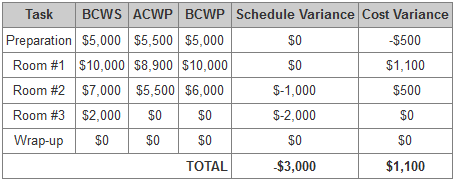
Hopefully your projects never have this type of variance!
A variance is defined as a schedule, technical, or cost deviation from the project plan. Variances should be tracked and reported, as well as mitigated through corrective actions. There are two types of variance which normally receive most of the attention:
- Cost Variance
- Schedule Variance
Calculating variances for an engineering project is an important step and requires the definition of several variables:
- BCWS, or Budgeted Cost of Work Scheduled, is the budgeted amount for each task at the specified point of analysis (usually today).
- BCWP, or Budgeted Cost of Work Performed, is the actual completion amount of each task relative to the task budget.
- ACWP, or Actual Cost of Work Performed, is the actual expenditure for each task.
And now, for the calculations:
- Cost Variance (CV) is the amount that the project in a cost overrun or underrun position:
CV = BCWP – ACWP - Schedule Variance (SV) is the amount that the project is behind or ahead of schedule:
SV = BCWP – BCWS
Obviously, the cost is used as the base variable in the calculation for both cost and schedule variance, which has caused some engineers to want to express them as a percentage:
- CVP = CV / BCWP
- SVP = SV / BCWS
However, the units of each variable does not have to be dollars. It can be hours, days, weeks, resource depletion units, etc.
Example
Let’s say you are the project manager for the renovation of 3 hotel rooms. The tasks are as follows:
- Preparation: Mar. 1-Mar. 10, $5,000
- Room #1: Mar. 10-20, $10,000
- Room #2: Mar. 15-25, $10,000
- Room #3: Mar. 20-30, $10,000
- Wrap-up: Mar. 25-31, $5,000
It’s Mar. 22 today. You figure you’re 100% complete on the preparation phase as well as Room #1, and 60% complete Room #2. Your receipts (plus timesheets, etc.) are showing $5,500 spent on preparation, $8,900 on Room #1, and $5,500 on Room #2.

In this case, we have a schedule problem (SV is negative) but not a cost problem (CV is positive). The project is behind schedule, but below budget relative to the tasks performed.











 isaac omari says
isaac omari says
April 12, 2014 at 5:55 amneed information on project management